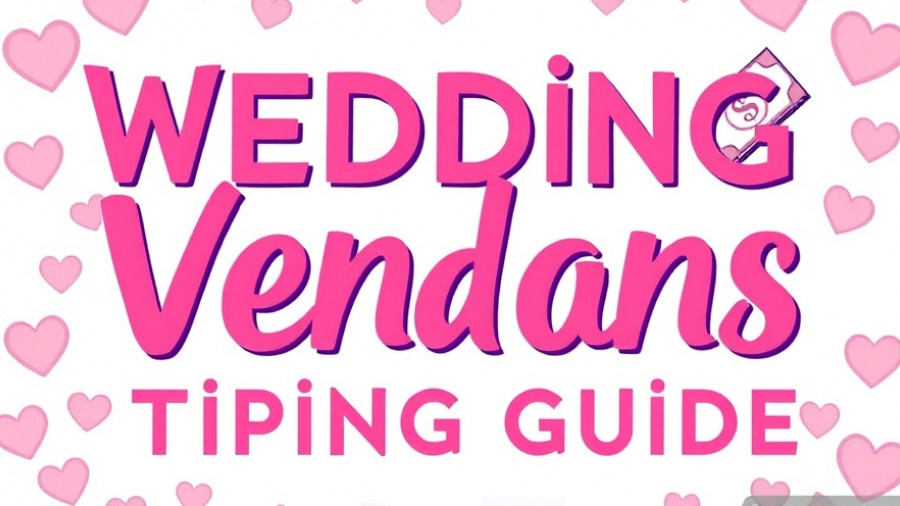
Understanding the Importance of Tipping
Tipping at weddings may seem like a small consideration, but it holds significant weight in expressing gratitude. This practice not only acknowledges the hard work of wedding vendors but also reinforces the notion that their labor is valued. It's essential to recognize that while tipping is not a strict requirement, it is common etiquette that can help ensure a positive experience for everyone involved on your special day.
Key Wedding Vendors to Consider for Tipping
Catering teams are often at the forefront of wedding services, and if gratuity isn’t already included in your contract, consider tipping 15-20% of the total bill. Not only does this acknowledge their effort during meal service, but it also gifts them with appreciation for the hours spent in preparation. Similarly, hair and makeup artists deserve recognition, as their skill sets contribute significantly to the overall aesthetic of your wedding. A tip of 15-20% of their fee is customary.
Photographers and videographers, integral in capturing your day, often receive tips ranging from $50 to $200, based on your satisfaction with their service. Musicians and DJs, who set the mood and keep the celebration flowing, can receive tips between $50 to $150 for their roles in creating a memorable atmosphere.
When and How to Distribute Tips Effectively
Preparation is key when it comes to distributing tips on your wedding day. It’s advisable to prepare cash tips in labeled envelopes for each vendor well ahead of time. Designate a trustworthy individual, such as your wedding planner or a family member, to handle the distribution. This can relieve you of the last-minute stress associated with this often-overlooked task.
Additionally, if your vendors utilize digital payment options like Venmo or Zelle, ensure you’ve confirmed this beforehand. This flexibility can allow for easier, contactless tips, making the process seamless.
Special Exceptions in Tipping Practices
While general rules apply, some situations call for exceptions. If a vendor owns the business, tipping is typically discretionary but appreciated if their service exceeded expectations. Similarly, in the case of DIY or micro weddings, where logistics may be simpler and staff limited, tipping may be adjusted accordingly.
Regional customs also play a role; urban areas may have a strong tipping culture compared to rural settings, where gifts or reviews may hold more significance.
Gauge Expectations and Prepare for Your Wedding
Understanding the financial implications of tipping can alleviate much of the pressure associated with wedding planning. It’s important to integrate these gratuities into your overall wedding budget from the beginning, ensuring that you account for them as a necessary expense.
For those worried about navigating the tipping landscape, consulting your wedding planner can be invaluable. Their expertise can guide you in following local customs and help ensure that you do not overlook key players in the success of your event.
Concluding Thoughts on Wedding Tipping Etiquette
Tipping your wedding vendors is about expressing appreciation for their skills and efforts in making your day memorable. Even though it may seem like an added expense, the goodwill generated by these simple gestures is unmatched. Take time to recognize each vendor's importance and ensure that they feel valued for their hard work.
Call to Action: Download Our Tipping Cheat Sheet
Are you feeling overwhelmed with planning your wedding? No worries! Download our Wedding Tipping Cheat Sheet for quick reference and keep your budget on track while ensuring you express gratitude where it's due!
 Add Row
Add Row  Add
Add 



Write A Comment